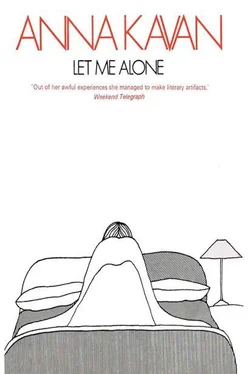And she took Anna’s arm and pressed it, smiling with that affected girlish simplicity of hers that never deceived Anna for a moment.
‘Yes,’ Anna replied.
But she very much doubted whether the friendship would ever materialize. She wondered what Lauretta was playing at. How did Lauretta want her to behave?
Anna stayed at Blue Hills, and almost before she knew it, she had settled down into a sort of routine there. Lauretta led rather a gay life for the country: plenty of lunches and teas and dinners and dances and bridge and tennis parties that filled up the days and made them pass quickly. She lived for her social amusements and for herself, for her own body — its clothing and feeding and bathing and scenting and beautifying and preserving. She was proud of the knowledge that she was the most fascinating woman within a thirty-mile range — in spite of her age.
Anna saw more of this social life than she had ever done before. She went out often with Lauretta to different parties. The various houses round about followed Lauretta’s hospitable lead, and a good deal of fairly lavish entertaining went on, especially among the older people. There was a rather noticeable scarcity of young people. Elderly successful people, youngish married couples and their children, but no really young people. Anna sometimes wondered what had become of everyone between school age and the later thirties. Their absence left a blank, a curious gap in the structure of the community.
Lauretta went everywhere, and Anna with her. Whether it was a formal dinner in one of the big houses, or an impromptu affair devised to fill some unexpectedly vacant evening, or a tea-party, or tennis, or a picnic, or a dance, or cards to be played with all the accessories of coffee cups and glasses and ash-trays and gold-painted, silk-tasselled pencils and velvet covered tables; she took part in it with Lauretta. She did not enjoy herself, and she was not much of a success. But she went everywhere and watched everything with her clear, blue-grey eyes, that were so steady, and in many ways so impersonal.
She was astonished at the enormous, persistent determination behind it all. All these parties and frivolities were the outcome of a sustained, deliberate effort of will; a universal will to gaiety. A sort of tyrannical, unquestioned law that gaiety was essential and must be maintained. Nothing spontaneous, ever. She felt that if once the revellers honestly considered the matter, they would find that they did not really enjoy the parties or want them at all, and the whole system would collapse. It was just determination that made them keep on: determination and habit. But then, supposing they abandoned their amusements, what were they to do? They did not seem to have or to be capable of having any other interests. Anna, who had been through a socialistic phase at Haddenham, disapproved of their existence. With her socialistic tendencies she disapproved of their pleasure-greedy, butterfly life. But she had to admit that there seemed to be no alternative.
Lauretta told everyone that Anna was clever.
‘A most talented young lady,’ she said coyly, smiling at the girl with a sort of glancing, fictitious roguishness. ‘I’d have you know that she’s a fully-fledged authoress already. A book of her poems is coming out soon.’
Anna was made extremely uncomfortable by these remarks.
‘Why did you say that?’ she asked Lauretta afterwards. ‘It’s not at all certain yet that Drummond will publish my verses.’
‘Of course he will publish them,’ Lauretta said. And from her quick, impatient manner it was obvious that she was determined that it should be so — or else there would be trouble. ‘Of course!’ she repeated, looking at Anna with a smiling mouth, but a hard, bright gleam in her eyes that was like a threat.
Anna was very uneasy.
Towards the end of May the weather became hot suddenly, and Anna needed some new summer dresses. She went into Lauretta’s bedroom to try them on. The big, lemon-and-silver room always fascinated her. With its silver walls and ceiling, its lemon silk curtains, its soft, soft carpet of slightly darker lemon, like lemon-curd, its sleek, silvery furniture, it seemed to exhale an actual perfume of femininity, an anima of female luxuriousness. The bathroom next door was like a laboratory with its pale gleaming purity and its rows of glistening bottles and appliances; a work-room of feminine beauty.
Anna was uneasy and fascinated. This refinement of female elegance, this insistence on the actual mechanism of producing female beauty, was rather too much for her. It made her uncomfortable. But at the same time, she was attracted by it, in a way.
She looked with a show of interest at the dresses, particularly at a dull green one, very simply made.
‘Don’t you like this blue frock?’ said Lauretta, holding up a frilled garment the colour of forget-me-nots, and watching the thin, straight figure in front of the mirror.
A thin body, with sloping shoulders, underneath a pale, grave face. And straight brown hair, rather untidy, over a too-high forehead. An uncomfortable, unfeminine sort of creature, Lauretta thought to herself.
But she knew that Anna was not unattractive. In that pale face, in those severely graceful limbs, was a strange potency that might draw a man, even draw him away from Lauretta herself.
Over the back of a chair lay the dull green dress that Lauretta did not care much about. It was a bluish, arsenical green, beautiful, but rather unusual. Anna was fingering the smooth, fresh-feeling material.
‘I like this one,’ she said.
‘But you could never wear that. Green isn’t a young girl’s colour. It wouldn’t suit you at all.’
Lauretta came forward and stretched out her hand with its flashing rings as if to take the dress away. But Anna held the cold, soft green against her neck, watching herself in the mirror, and a new light came into her eyes, greenish, as if reflected from the green stuff.
‘Yes!’ she said softly. ‘I like it immensely.’
‘Then I’m afraid your taste isn’t very good. Green is the last colour you should wear. Why, with your sallow skin it makes you look like a suet-pudding!’
Lauretta could be swiftly roused to irritation if she was opposed in any way. She seemed to take the disagreement as a personal affront.
Anna had almost forgotten her aunt, enthralled by the contrast of the lovely greenish stuff with the yellow-pale flesh. Now the angry, impatient voice brought her quickly back to earth. She put down the dress, smiling gravely at Lauretta.
‘I’m sorry you don’t like me in green,’ she said, with a hint of propitiatory gentleness. ‘I’m so fond of it. I think it suits my personality.’
‘Suits your personality! What an expression!’ Lauretta laughed a hard, tinkling, malicious laugh, as at some stupid absurdity. ‘What a mass of affectations you are! When I was your age, girls didn’t use words like that.’
‘Would you rather I spoke always in words of one syllable?’ asked Anna, in her calm, involuntarily supercilious voice.
‘There is no need to be insolent,’ said Lauretta, turning away.
‘I’m sorry. I didn’t mean to be rude,’ Anna said, rather confused. ‘Please don’t be angry.’ She looked shyly at her aunt, not knowing how to behave.
‘Why am I not more careful what I say? I must think before I speak,’ she thought unhappily.
Lauretta was really offended. Her eyes rested upon Anna with disapproval.
‘I put up with a lot from you,’ she said, with her cold, almost cruel brightness, like a beautiful, cruel bird darting and flashing with vivid, brilliant plumage and vicious, stiletto-sharp beak. ‘I put up with a lot because Rachel says you are clever. I believe in what she tells me. Otherwise I should not be so lenient with you.’
Читать дальше












